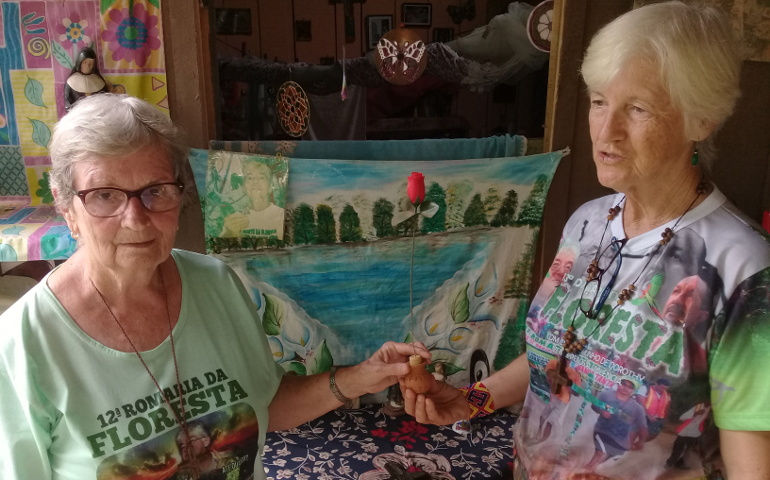
Sr. Jane Dwyer and Sr. Katy Webster, both Sisters of Notre Dame de Namur, continue the ministry of Sr. Dorothy Stang of the same congregation, who was assassinated in 2005 in retribution for her work with landless farmers. The dirt inside the little vase they are holding was moistened with Sr. Dorothy’s blood. It was collected by Fr. Jose Amaro at the exact place she was assassinated. (Carlos Tautz)
In a simple wooden house on an unpaved street in the violent town of Anapu, near the heart of the Brazilian Amazon region, live two Catholic sisters who share pleasantries with neighbors and infuriate large landowners of the region.
Jane Dwyer, 78, and Kathryn "Katy" Webster, 66, both Sisters of Notre Dame de Namur, quietly help support poor agricultural workers in their struggles for land and better living conditions. The sisters continue the legacy of Sr. Dorothy Stang of the same congregation, who was murdered 14 years ago in rural Anapu.
In conversations among small circles of people, the area's powerful landowners blame the sisters and still accuse Stang of being responsible for the invasion of large properties by agricultural workers. "The big landowners think we are dangerous bandits for what we do," joked Dwyer. The only activity she and Webster engage in, Dwyer said, is to work with the Pastoral Land Commission (CPT), an arm of the Catholic Church that supports landless agricultural workers. Stang had also done so until she was killed at age 73.
"The people do not need us to decide what to do — they do it on their own,'' Dwyer said. "People only need a friendly presence," she added, explaining that missionaries never make decisions such as instigating land occupations. "The landowners like to blame us, but it was the people themselves who created the process of going to the government and saying 'there is an enormous piece of land that looks good and has no owner,' " Dwyer said. "When people occupied the land, we entered into the story. But we never encouraged them."
The sisters carry on their ministry against a complex social, economic and political backdrop in the region and the country. Tensions over land disputes are rising, evidenced by a rash of killings of agricultural workers involved in property claims. Thousands of workers drawn to the area by the Brazilian government's rapid construction of huge infrastructure projects, such as the nearby Bela Monte mega-dam, add to the land struggles. With the building boom waning, many now-unemployed workers strain the already-weak housing and sanitation services in Anapu.
The region is getting attention from the Vatican as well, with Pope Francis initiating a special Amazon synod in Rome Oct. 6-27 focusing on land use, biodiversity and rights of indigenous people.
The election of pro-development President Jair Bolsanaro presages more conflict. On the local level, landlords are turning to police, authorities and courts to fight back.
That's the case with Fr. Jose Amaro, who also worked with Stang. He recently defended himself in court against charges related to land occupation. After being threatened with death several times and jailed for three months, Amaro was released but forced to move to Altamira, about 80 kilometers (50 miles) from Anapu, as the case winds through Brazil's laborious legal system. His activities are restricted. He can celebrate mass, but cannot leave his residence between 8 p.m. and 6 a.m., must go to the courthouse and sign a "term of presence" every three months and cannot participate in any meetings or demonstrations involving land struggles or other public activities.



